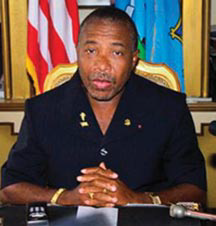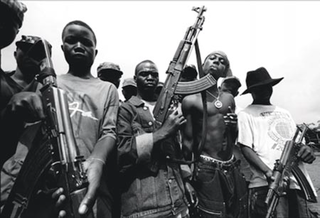
Liberia is a country in West Africa founded by free people of color from the United States. The emigration of African Americans, both freeborn and recently emancipated, was funded and organized by the American Colonization Society (ACS). The mortality rate of these settlers was the highest among settlements reported with modern recordkeeping. Of the 4,571 emigrants who arrived in Liberia between 1820 and 1843, only 1,819 survived (39.8%).

The Politics of Liberia takes place in a framework of a presidential representative democratic republic modeled on the government of the United States, whereby the President is the head of state and head of government; unlike the United States, however, Liberia is a unitary state as opposed to a federation and has a pluriform multi-party system rather than the two-party system that characterizes US politics. Executive power is exercised by the government. Legislative power is vested in both the government and the two chambers of the legislature.

The Armed Forces of Liberia (AFL) are the armed forces of the Republic of Liberia. Tracing its origins to a militia that was formed by the first black colonists in what is now Liberia, it was founded as the Liberian Frontier Force in 1908, and retitled in 1956. For almost all of its history, the AFL has received considerable materiel and training assistance from the United States. For most of the 1941–89 period, training was largely provided by U.S. advisers, though this assistance has not prevented the same generally low levels of effectiveness common to most of the armed forces in the developing world.

Charles McArthur Ghankay Taylor is a Liberian former politician and convicted war criminal who served as the 22nd president of Liberia from 2 August 1997 until his resignation on 11 August 2003 as a result of the Second Liberian Civil War and growing international pressure.
The Krahn are an ethnic group of Liberia and Ivory Coast. This group belongs to the Kru language family and its people are sometimes referred to as the Wee, Guéré, Sapo, or Wobe. It is likely that Western contact with the Kru language is the primary reason for the development of these different names.
Prince Yormie Johnson is a Liberian politician who has served as a senator for Nimba County since 2006. A former rebel leader, Johnson played a prominent role in the First Liberian Civil War.

Foday Saybana Sankoh was the founder of the Sierra Leone rebel group Revolutionary United Front (RUF), which was supported by Charles Taylor-led NPFL in the 11-year-long Sierra Leone Civil War, starting in 1991 and ending in 2002. An estimated 50,000 people were killed during the war, and over 500,000 people were displaced in neighboring countries.

The First Liberian Civil War was the first of two civil wars within the West African nation of Liberia. It lasted from 1989 to 1997. President Samuel Doe established a regime in 1980 but totalitarianism and corruption led to unpopularity and the withdrawal of the support of the United States by the late 1980s. The National Patriotic Front of Liberia (NPFL) led by Charles Taylor invaded Liberia from the Ivory Coast to overthrow Doe in December 1989 and gained control over most of the country within a year. Doe was captured and executed by the Independent National Patriotic Front of Liberia (INPFL), a splinter faction of the NPFL led by Prince Johnson, in September 1990. The NPFL and INPFL fought each other for control of the capital city, Monrovia and against the Armed Forces of Liberia and pro-Doe United Liberation Movement of Liberia for Democracy. Peace negotiations and foreign involvement led to a ceasefire in 1995 but fighting continued until a peace agreement between the main factions occurred in August 1996. Taylor was elected President of Liberia following the 1997 Liberian general election and entered office in August of the same year.

The Second Liberian Civil War was a civil war in the West African nation of Liberia that lasted from 1999 to 2003.
The United Liberation Movement of Liberia for Democracy (ULIMO) was a pro-government militia that participated in the First Liberian Civil War (1989–1996).
The National Patriotic Front of Liberia (NPFL) was a Liberian rebel group that initiated and participated in the First Liberian Civil War from 24 December 1989 – 2 August 1997. The NPFL emerged out of rising ethnic tensions and civil unrest due to the Liberian government that was characterized by totalitarianism, corruption, and favoritism towards ethnic Krahns. The NPFL invaded Liberia through Ivory Coast’s border with Nimba County in Liberia under the direction of Charles Taylor, a former Liberian politician and guerrilla leader who served as the 22nd president of Liberia from 2 August 1997 until his resignation on 11 August 2003.

The Independent National Patriotic Front of Liberia (INPFL) was a rebel group that participated in the First Liberian Civil War under the leadership of Prince Johnson. It was a breakaway faction of the National Patriotic Front of Liberia (NPFL).
The National Patriotic Front of Liberia-Central Revolutionary Council (NPFL-CRC) was a rebel group that participated in the First Liberian Civil War. The group emerged in mid-1994 and was a breakaway faction of the National Patriotic Front of Liberia (NPFL), which was led by Charles Taylor in full Charles Ghankay Taylor.
Dr. George Eutychianus Saigbe Boley is a Liberian politician and former warlord. He is a member of the Krahn ethnic group. Boley was a junior minister in the administration of President William Tolbert, but was briefly jailed for his associations with opposition groups. He was released on the morning of the 1980 military coup that brought Samuel Doe to power. Boley later became Minister of Presidential Affairs and Minister of Education under President Doe. After Doe's murder in September 1990, he went into exile in the United States, but was deported by the US government in 2012, after being accused of committing atrocities during the civil war including commanding armed child soldiers. He returned to Liberia and took over the leadership of the Liberia Peace Council (LPC), a rebel group that participated in the Liberian Civil War. Boley spent two years in U.S. custody.
Joshua Milton Blahyi, better known by his nom de guerre General Butt Naked, is a Liberian evangelical preacher, writer and former warlord best known for his actions during the First Liberian Civil War. During the conflict, Blahyi led a group of soldiers which fought on the side of anti-rebel group United Liberation Movement of Liberia for Democracy (ULIMO) before converting to Christianity and becoming a pastor in 1996.

United Nations Security Council resolution 856, adopted unanimously on 10 August 1993, after reaffirming Resolution 813 (1993) and welcoming a peace agreement signed, under the auspices of the Economic Community of West African States (ECOWAS), between the Interim Government of National Unity of Liberia (IGNU), the National Patriotic Front of Liberia (NPFL), and the United Liberation Movement for Democracy (ULIMO), the Council approved a dispatch of 30 military observers to Liberia.
John Hezekiah Bowen was an officer of the Armed Forces of Liberia.

Jucontee Thomas Woewiyu, also known as Tom Woewiyu or Thomas Smith, was the former leader of the National Patriotic Front of Liberia (NPFL), with Charles Taylor.

The Liberia national transitional government was a provisional government, or rather the name given to three successive governments, in Liberia formed in the midst of the First Liberian Civil War. The LNTG was product of the July 25, 1993, Cotonou Peace Accord, whereby the Interim Government of National Unity disbanded. The respective LNTG-I, LNTG-II and LNTG-III governments were differentiated by being led by three different chairpersons. Initially supposed to last for six months to allow for disarmament of warring factions and preparations of national elections, the LNTG timeline lasted until mid-1997. Various of the warring factions had direct participation in the LNTG and civilian elements were gradually sidelined. Through participation in the provisional governance of LNTG the different warlords could gain access to state resources, even in situations when armed hostilities continued. The LNTG period ended with the 1997 Liberian general election whereby Charles Taylor was elected President of Liberia.
Isaac Saye Musa was a Liberian military official and politician. Musa was one of the top field commanders of National Patriotic Front of Liberia (NPFL) in the First Liberian Civil War. He served in government functions in the transitional governments during the 1990s. A noted loyalist of Charles Taylor, Musa would eventually fall out of favour with Taylor.








